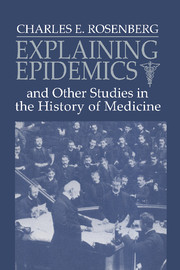Book contents
- Frontmatter
- Contents
- Acknowledgments
- Introduction: Why care about the history of medicine?
- I Ideas as actors
- 1 The therapeutic revolution: Medicine, meaning, and social change in nineteenth-century America
- 2 Medical text and social context: Explaining William Buchan's Domestic Medicine
- 3 John Gunn: Everyman's physician
- 4 Body and mind in nineteenth-century medicine: Some clinical origins of the neurosis construct
- 5 Florence Nightingale on contagion: The hospital as moral universe
- 6 Cholera in nineteenth-century Europe: A tool for social and economic analysis
- II Institutions and medical care
- III The past in the present: Using medical history
- Index
3 - John Gunn: Everyman's physician
Published online by Cambridge University Press: 29 March 2010
- Frontmatter
- Contents
- Acknowledgments
- Introduction: Why care about the history of medicine?
- I Ideas as actors
- 1 The therapeutic revolution: Medicine, meaning, and social change in nineteenth-century America
- 2 Medical text and social context: Explaining William Buchan's Domestic Medicine
- 3 John Gunn: Everyman's physician
- 4 Body and mind in nineteenth-century medicine: Some clinical origins of the neurosis construct
- 5 Florence Nightingale on contagion: The hospital as moral universe
- 6 Cholera in nineteenth-century Europe: A tool for social and economic analysis
- II Institutions and medical care
- III The past in the present: Using medical history
- Index
Summary
If William Buchan's Domestic Medicine was a product of the Scottish Enlightenment, John Gunn's vastly popular guide to domestic practice embodied its particular time and place: Knoxville in 1830, the trans- Appalachian South in the era of Andrew Jackson. This essay was written to serve as an introduction to a facsimile reprinting of the text by the University of Tennessee Press, which was wary of publishing this seemingly arcane if widely read and often-reprinted book without an accessible introduction. I was attracted to the project because it seemed a natural extension of my work on Buchan.
Both self-help manuals shared significant characteristics, despite the six decades that separated their composition. They were products of a medical world very different from that to which we have become accustomed in the late twentieth century. It was a world in which knowledge and competence were not segregated in credentialed heads and hands. These books were not only read but used. Thus they did not simply describe but helped constitute a system of medical care and social relations now largely extinct. Despite such important similarities to its Edinburgh predecessor, the Knoxville physician's Domestic Medicine is a distinctively American artifact. Its rambling paragraphs tell us a great deal about the world-view and social relations prevailing in antebellum America – and about the ways in which texts formally medical can provide insight into key assumptions of the culture in which they are produced.
- Type
- Chapter
- Information
- Explaining Epidemics , pp. 57 - 73Publisher: Cambridge University PressPrint publication year: 1992



